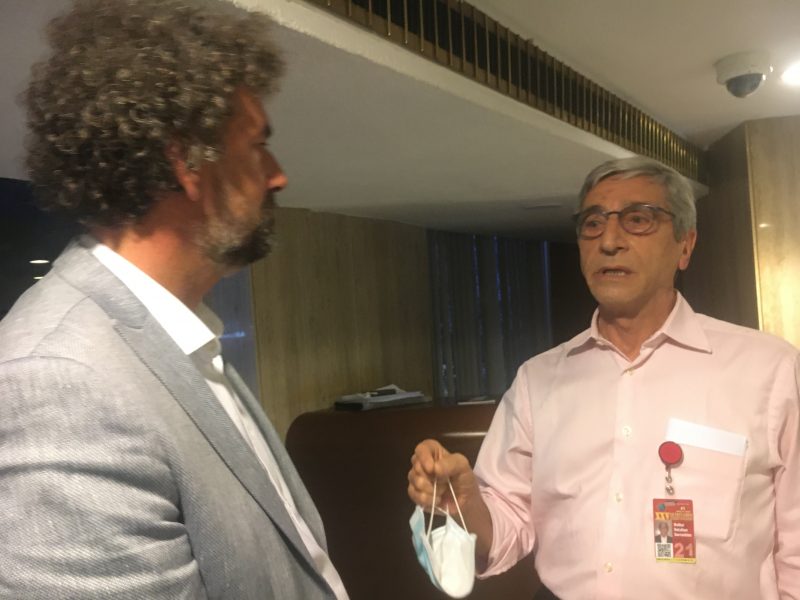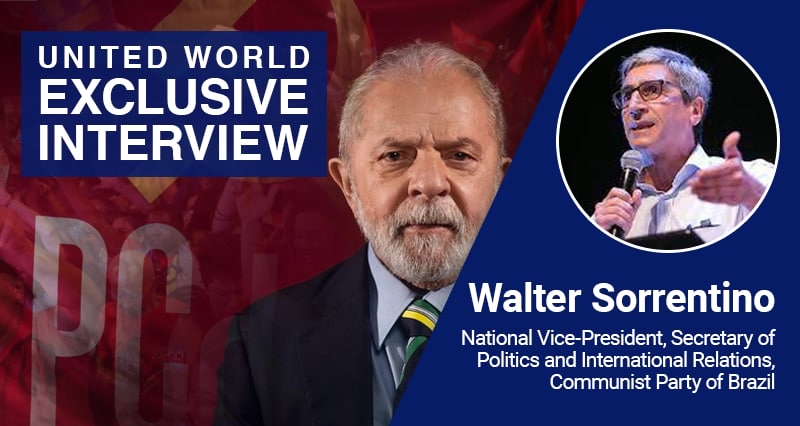The victory of Luiz Inacio Lula da Silva, better known as ‘Lula’, in Brazil keeps on fueling hopes, disillusions, debates and questions in Latin America and worldwide. What does it mean for the country’s foreign and domestic politics? How will Lula govern, given he is facing a conservative majority in the parliament? How will Jair Bolsonaro, who already had contested the electoral results before the elections, react? And what about the Evangelics, who have been a matter of discussion since years and who increasingly make their way into politics?
Though he states that Lula faces a “devastated territory”, Walter Sorrentino is still optimistic. He is the National Vice-President of the Communist Party of Brazil, which is part of Lula’s coalition and is represented by its own members in the parliament. Sorrentino is also his party’s Secretary for international relations. We therefore started our interview over the phone with Brazil’s foreign policy.
Stopped: the change of Brazil’s institutional regime
How do you interpret the results of the presidential, parliamentary and governor elections? What is your basic observation?
It was an extraordinary victory against a candidate for re-election, who made use of the dirtiest government machinery and the “hate office”. He used millions of dollars to spread fake news and followed the political strategy to get re-elected in order to complete the job of changing the institutional regime in Brazil.

Decision to establish “broadest possible front”
The key factors of Lula’s victory were the following: the decision to establish a broad coalition around Lula, the broadest political front since the fight against the military dictatorship; the message of hope against that of fear; and the reconstruction of the country and democracy. The tactics of a broad front once again proved its value against fascistic tendencies. The other decisive active factor was the personal role of Luiz Inácio Lula da Silva, a political giant whose history is a saga, with his ability to interpret the feelings of the poorest, in the struggle for social equity, sovereign development and democratic participation.
As you are you are active in international politics: What fundamental changes should be expected in Brazil’s foreign policy with the presidential change? What will be the most important difference in this area between Bolsonaro and Lula?
Brazil will once again be a respected and admired protagonist, as was already demonstrated in the campaign. Brazil is a great nation, with a high profile and active foreign policy for the sake of the self-determination of nations, peace and multilateralism. As a global actor, Brazil owns great tools to play a decisive role in the emerging multipolarity in the world, articulating the access of the Latin American bloc to the BRICS, together with the Americas, Eurasia, the Middle East and Africa.
Expectation that Mercosur, CELAC and Unasur “will be resumed”
Lula has been a great promoter of Latin American integration. What concrete steps should be expected from your government regarding the advancement of this integration?
We expect the resumption of Mercosur, the resumption of CELAC and that of the Unasur. Additionally, the presence of these in the UN and other international organizations will be strengthened. That presence will further democratize the UN and other international institutions.
In South America, right-wing governments are reduced to the half since 2019. They only govern Ecuador, Paraguay and Uruguay. Progressive governments command 93.6% of the region’s GDP. It is a bloc that, acting for sovereign development, will play a growing role in the new geopolitical reality. Even more so, as every day proves again and again the difficulties of the United States to maintain its hegemony, despite the strength it still has in the region.
Brazil “does not have to support US strategy – which only consists in responding to Washington’s relative decline”
Another major issue in world politics is the conflict in Ukraine. The United States is expanding NATO with Sweden and Finland and is preparing new cooperation with Asian countries. At the same time, Washington does not seem interested in a diplomatic solution. It continues to send arms and financing to Ukraine, while trying to isolate Russia. It sabotajes the relations that this country has with others, applying ex-territorial sanctions. What will be the position of the Lula government? Participating in sanctions? Or on the contrary, would you try to strengthen BRICS as a pole?
Surely the new government will not participate in the sanctions against Russia. It will act for peace, for negotiated solutions, for the self-determination of nations.
Brazil does not have to support the US strategy. The US is reacting to its relative decline of world power, with a continuous and multidimensional war against China and the containment of Russia. These two are strategically aligned countries. This American strategy is condemning the European Union to a situation of growing dependence and setbacks.
Our foreign policy will be a version of the global South-South strategy adapted to the great geostrategic changes taking place on the international scene.
Bolsonarism was the world’s biggest far-right government – it will now shrink to 20-25%
In the transition process, do you expect any disruptive steps from Bolsonarism, and if so, which ones?
Bolsonarism has been deeply inserted into social reality. Bolsonaro was the strongest far-right government in the world, rooted in denialism, anti-systemism, and the meritocracy of large portions of society in the midst of the social crisis. And a powerful network of algorithms that not only reflect but also shape social consciousness nourished it.
It will be a closed opposition and even outside the constitutional rules, based on a central base of Bolsonarism, estimated at 20-25% of its voters. In any case, Bolsonaro will progressively weaken as a leader. He will intend to return to the 2026 elections, if he is not institutionally contained by numerous criminal proceedings that can even lead him to jail.
Lula faces “devastated territory”
The arithmetic of the Brazilian parliament presents a difficult scenario for the Lula government. What problems does the PT expect and how is its strategy to ensure governability?
The new government will face “devastated territory” in the social, economic and even institutional spheres. Dozens of regressive constitutional reforms already passed.
It will not be a “PT government”, but one with broad forces to pacify the country, promote institutional and economic normality, stability and predictability, without giving up its program. This program consists of a wide range of immediate social measures, resumption of employment and income, reindustrialization of the country in search of sovereign development.
Lula will progressively negotiate with the new Congress, which is mostly conservative. Still, he has accumulated strong political capital with 60 million votes and has dozens of parties at his side, in addition to broad popular support.
The programmatic basis for reindustrialization and sovereign development is the leading role of the State, inducing investments through strategic state companies. This includes health, education, science and technology to enter industry 4.0. The government will also promote the ecological transition, with the defense of the clean energy matrix that already predominates in the country, the defense of the environment and the rich biodiversity of Brazil, especially in the Amazon.
Will Lula deliver progress or end up being a government of conservation?
On the one hand, it is noted that the governments of Biden, Macron and the like were very quick to congratulate Lula. Magazines like the English The Economist have – before the elections – openly criticized or rejected Bolsonaro’s re-election. On the other, Lula has built a very broad alliance and his first speech seems to have as its main goal “to restore democracy and order.” Aren’t you afraid that the Lula government will end up being a conservation government rather than delivering essential progress?
No, I am not afraid. Democracy and order come in favor of development. I think in some way it will be a transitional government. Lula declared already that he would not run for re-election. This will be a government to promote a new accumulation of forces from the progressive and popular field, governing with centrist political sectors.
The measures of our program will quickly reach the daily lives of people. They are distressed by the setbacks of recent years, after a pandemic that claimed the lives of almost 700,000 people, given the sabotage promoted by the Bolsonaro government in its confrontation. Our idea is that we will have to progressively build a new political majority around a national pact for development.
Brazil and the economic crisis
In this context: A deepening of the world economic crisis is observed. How is this reflected in Brazil, and what will be the responses of the Lula government?
Yes, the crisis worries a lot. Inflation, recession, rising interest rates, war and aggressive US escalation with its anti-China strategy. At the same time, there are very significant strategic maneuvering spaces for Brazil in the new geopolitical reality to pursue its interests. Especially in the context of multipolarity and multilateralism.
There are historical precedents in our country in this regard, such as the Second World War. Getúlio Vargas, then president, laid the foundations for a national development project that achieved the highest growth rates in the world throughout the 20th century, from 1930 to1980.
The rise of evangelism
And this is a complicated question, but the topic catches my attention: Many say that evangelism is gaining strength throughout Latin America and is becoming a political force. Where does this evangelism come from, what is its political-economic leadership, and what is its weight in Brazilian politics?
The neo-Pentecostal evangelical churches promoted the resurgence of religiosity as a political weapon. It is a very remarkable, extensive, multimillion-dollar and very powerful phenomenon: television networks and diffused temples throughout the country, which seem to be a new type of House of Minting with the tithes collected.
They achieved strong congressional representation and won the government of the State of São Paulo, the most powerful in the country. The temples provide a network of spiritual and social support in the face of the crisis of the social welfare state and public services.
This occurs in a context of senile neoliberalism, which does not offer new consensus or future plans for social majorities. Time of financialization of wealth, which imprisons the national states into the logic of rent-seeking. It turns the states to slaves of public debt that produces dividends for the hegemonic economic sectors of society. A time of great social despair occurs, without the references that predominate in the social structure from labor relations.
All this calls us to examine new ways of working with political awareness, the pedagogies necessary to reach the hearts and minds of these immense social layers, the role of the State and the ways to expand democracy.
This is what I believe: Without speaking of accelerated and sovereign development, there is no way to go to those plots as a basis for a popular, patriotic and democratic project, which could open paths for higher forms of social regime, against neocolonialism and for the sake of making forms of public property predominate, of transitions to socialist forms.

















Leave a Reply